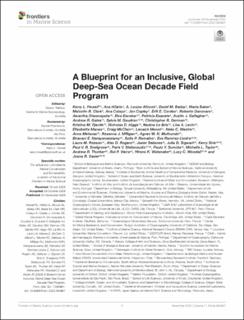| dc.contributor.author | Howell, Kerry L. | |
| dc.contributor.author | Hilário, Ana | |
| dc.contributor.author | Allcock, A. Louise | |
| dc.contributor.author | Bailey, David M | |
| dc.contributor.author | Baker, Maria | |
| dc.contributor.author | Clark, Malcolm R. | |
| dc.contributor.author | Colaço, Ana | |
| dc.contributor.author | Copley, Jon | |
| dc.contributor.author | Cordes, Erik | |
| dc.contributor.author | Danovaro, Roberto | |
| dc.contributor.author | Dissanayake, Awantha | |
| dc.contributor.author | Escobar, Elva | |
| dc.contributor.author | Esquete, Patricia | |
| dc.contributor.author | Gallagher, Austin J | |
| dc.contributor.author | Gates, Andrew R. | |
| dc.contributor.author | Gaudron, Sylvie M. | |
| dc.contributor.author | German, Christopher R. | |
| dc.contributor.author | Gjerde, Kristina M | |
| dc.contributor.author | Higgs, Nicholas D. | |
| dc.contributor.author | Le Bris, Nadine | |
| dc.contributor.author | Levin, Lisa A. | |
| dc.contributor.author | Manea, Elisabetta | |
| dc.contributor.author | McClain, Craig | |
| dc.contributor.author | Menot, Lenaick | |
| dc.contributor.author | Mestre, Nélia C. | |
| dc.contributor.author | Metaxas, Anna | |
| dc.contributor.author | Milligan, Rosanna J | |
| dc.contributor.author | Muthumbi, Agnes WN | |
| dc.contributor.author | Narayanaswamy, Bhavani E. | |
| dc.contributor.author | Ramalho, Sofia P. | |
| dc.contributor.author | Ramirez-Llodra, Eva | |
| dc.contributor.author | Robson, Laura M | |
| dc.contributor.author | Rogers, Alex D. | |
| dc.contributor.author | Sellanes, Javier | |
| dc.contributor.author | Sigwart, Julia D. | |
| dc.contributor.author | Sink, Kerry | |
| dc.contributor.author | Snelgrove, Paul V. R. | |
| dc.contributor.author | Stefanoudis, Paris V. | |
| dc.contributor.author | Sumida, Paulo Y. | |
| dc.contributor.author | Taylor, Michelle L. | |
| dc.contributor.author | Thurber, Andrew R. | |
| dc.contributor.author | Vieira, Rui P | |
| dc.contributor.author | Watanabe, Hiromi K. | |
| dc.contributor.author | Woodall, Lucy C. | |
| dc.contributor.author | Xavier, Joana R. | |
| dc.date.accessioned | 2021-07-16T11:11:08Z | |
| dc.date.available | 2021-07-16T11:11:08Z | |
| dc.date.created | 2021-03-11T13:43:23Z | |
| dc.date.issued | 2020 | |
| dc.identifier.citation | Frontiers in Marine Science. 2020, 7, 584861. | en_US |
| dc.identifier.issn | 2296-7745 | |
| dc.identifier.uri | https://hdl.handle.net/11250/2764671 | |
| dc.description.abstract | The ocean plays a crucial role in the functioning of the Earth System and in the provision of vital goods and services. The United Nations (UN) declared 2021–2030 as the UN Decade of Ocean Science for Sustainable Development. The Roadmap for the Ocean Decade aims to achieve six critical societal outcomes (SOs) by 2030, through the pursuit of four objectives (Os). It specifically recognizes the scarcity of biological data for deep-sea biomes, and challenges the global scientific community to conduct research to advance understanding of deep-sea ecosystems to inform sustainable management. In this paper, we map four key scientific questions identified by the academic community to the Ocean Decade SOs: (i) What is the diversity of life in the deep ocean? (ii) How are populations and habitats connected? (iii) What is the role of living organisms in ecosystem function and service provision? and (iv) How do species, communities, and ecosystems respond to disturbance? We then consider the design of a global-scale program to address these questions by reviewing key drivers of ecological pattern and process. We recommend using the following criteria to stratify a global survey design: biogeographic region, depth, horizontal distance, substrate type, high and low climate hazard, fished/unfished, near/far from sources of pollution, licensed/protected from industry activities. We consider both spatial and temporal surveys, and emphasize new biological data collection that prioritizes southern and polar latitudes, deeper (> 2000 m) depths, and midwater environments. We provide guidance on observational, experimental, and monitoring needs for different benthic and pelagic ecosystems. We then review recent efforts to standardize biological data and specimen collection and archiving, making “sampling design to knowledge application” recommendations in the context of a new global program. We also review and comment on needs, and recommend actions, to develop capacity in deep-sea research; and the role of inclusivity - from accessing indigenous and local knowledge to the sharing of technologies - as part of such a global program. We discuss the concept of a new global deep-sea biological research program ‘Challenger 150,’ highlighting what it could deliver for the Ocean Decade and UN Sustainable Development Goal 14. | en_US |
| dc.language.iso | eng | en_US |
| dc.publisher | Frontiers | en_US |
| dc.rights | Navngivelse 4.0 Internasjonal | * |
| dc.rights | Navngivelse 4.0 Internasjonal | * |
| dc.rights.uri | http://creativecommons.org/licenses/by/4.0/deed.no | * |
| dc.title | A Blueprint for an Inclusive, Global Deep-Sea Ocean Decade Field Program | en_US |
| dc.type | Peer reviewed | en_US |
| dc.type | Journal article | en_US |
| dc.description.version | publishedVersion | en_US |
| dc.rights.holder | Copyright © 2020 The Authors | en_US |
| dc.source.pagenumber | 25 | en_US |
| dc.source.volume | 7 | en_US |
| dc.source.journal | Frontiers in Marine Science | en_US |
| dc.identifier.doi | 10.3389/fmars.2020.584861 | |
| dc.identifier.cristin | 1897319 | |
| dc.source.articlenumber | 584861 | en_US |
| cristin.ispublished | true | |
| cristin.fulltext | original | |
| cristin.qualitycode | 1 | |

